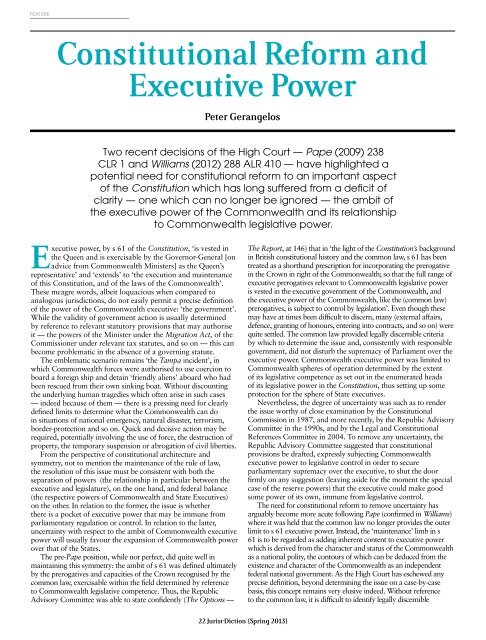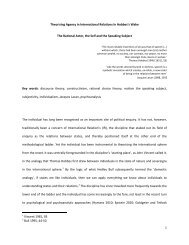PeoPLe, PoLicieS And PLebiSciteS: reforming the conStitution
PeoPLe, PoLicieS And PLebiSciteS: reforming the conStitution
PeoPLe, PoLicieS And PLebiSciteS: reforming the conStitution
Create successful ePaper yourself
Turn your PDF publications into a flip-book with our unique Google optimized e-Paper software.
FEATURE<br />
feature<br />
Constitutional Reform and<br />
Executive Power<br />
Peter Gerangelos<br />
Two recent decisions of <strong>the</strong> High Court — Pape (2009) 238<br />
CLR 1 and Williams (2012) 288 ALR 410 — have highlighted a<br />
potential need for constitutional reform to an important aspect<br />
of <strong>the</strong> Constitution which has long suffered from a deficit of<br />
clarity — one which can no longer be ignored — <strong>the</strong> ambit of<br />
<strong>the</strong> executive power of <strong>the</strong> Commonwealth and its relationship<br />
to Commonwealth legislative power.<br />
Left: Gough Whitlam and Bob Hawke watching Sir John<br />
Kerr putting his reserve powers shotgun away in <strong>the</strong><br />
Australian Constitution safe. McCrae, Stewart, 1919-<br />
“Does this mean we’ll have to blow <strong>the</strong> safe before we can<br />
disarm him?” National Library of Australia, vn3105152.<br />
Without reference to <strong>the</strong> common<br />
law, it is difficult to identify legally<br />
discernible criteria by which to<br />
determine <strong>the</strong> outer bounds of<br />
executive power.<br />
Executive power, by s 61 of <strong>the</strong> Constitution, ‘is vested in<br />
<strong>the</strong> Queen and is exercisable by <strong>the</strong> Governor-General [on<br />
advice from Commonwealth Ministers] as <strong>the</strong> Queen’s<br />
representative’ and ‘extends’ to ‘<strong>the</strong> execution and maintenance<br />
of this Constitution, and of <strong>the</strong> laws of <strong>the</strong> Commonwealth’.<br />
These meagre words, albeit loquacious when compared to<br />
analogous jurisdictions, do not easily permit a precise definition<br />
of <strong>the</strong> power of <strong>the</strong> Commonwealth executive: ‘<strong>the</strong> government’.<br />
While <strong>the</strong> validity of government action is usually determined<br />
by reference to relevant statutory provisions that may authorise<br />
it — <strong>the</strong> powers of <strong>the</strong> Minister under <strong>the</strong> Migration Act, of <strong>the</strong><br />
Commissioner under relevant tax statutes, and so on — this can<br />
become problematic in <strong>the</strong> absence of a governing statute.<br />
The emblematic scenario remains ‘<strong>the</strong> Tampa incident’, in<br />
which Commonwealth forces were authorised to use coercion to<br />
board a foreign ship and detain ‘friendly aliens’ aboard who had<br />
been rescued from <strong>the</strong>ir own sinking boat. Without discounting<br />
<strong>the</strong> underlying human tragedies which often arise in such cases<br />
— indeed because of <strong>the</strong>m — <strong>the</strong>re is a pressing need for clearly<br />
defined limits to determine what <strong>the</strong> Commonwealth can do<br />
in situations of national emergency, natural disaster, terrorism,<br />
border-protection and so on. Quick and decisive action may be<br />
required, potentially involving <strong>the</strong> use of force, <strong>the</strong> destruction of<br />
property, <strong>the</strong> temporary suspension or abrogation of civil liberties.<br />
From <strong>the</strong> perspective of constitutional architecture and<br />
symmetry, not to mention <strong>the</strong> maintenance of <strong>the</strong> rule of law,<br />
<strong>the</strong> resolution of this issue must be consistent with both <strong>the</strong><br />
separation of powers (<strong>the</strong> relationship in particular between <strong>the</strong><br />
executive and legislature), on <strong>the</strong> one hand, and federal balance<br />
(<strong>the</strong> respective powers of Commonwealth and State Executives)<br />
on <strong>the</strong> o<strong>the</strong>r. In relation to <strong>the</strong> former, <strong>the</strong> issue is whe<strong>the</strong>r<br />
<strong>the</strong>re is a pocket of executive power that may be immune from<br />
parliamentary regulation or control. In relation to <strong>the</strong> latter,<br />
uncertainty with respect to <strong>the</strong> ambit of Commonwealth executive<br />
power will usually favour <strong>the</strong> expansion of Commonwealth power<br />
over that of <strong>the</strong> States.<br />
The pre-Pape position, while not perfect, did quite well in<br />
maintaining this symmetry: <strong>the</strong> ambit of s 61 was defined ultimately<br />
by <strong>the</strong> prerogatives and capacities of <strong>the</strong> Crown recognised by <strong>the</strong><br />
common law, exercisable within <strong>the</strong> field determined by reference<br />
to Commonwealth legislative competence. Thus, <strong>the</strong> Republic<br />
Advisory Committee was able to state confidently (The Options —<br />
The Report, at 146) that in ‘<strong>the</strong> light of <strong>the</strong> Constitution’s background<br />
in British constitutional history and <strong>the</strong> common law, s 61 has been<br />
treated as a shorthand prescription for incorporating <strong>the</strong> prerogative<br />
in <strong>the</strong> Crown in right of <strong>the</strong> Commonwealth; so that <strong>the</strong> full range of<br />
executive prerogatives relevant to Commonwealth legislative power<br />
is vested in <strong>the</strong> executive government of <strong>the</strong> Commonwealth, and<br />
<strong>the</strong> executive power of <strong>the</strong> Commonwealth, like <strong>the</strong> (common law)<br />
prerogatives, is subject to control by legislation’. Even though <strong>the</strong>se<br />
may have at times been difficult to discern, many (external affairs,<br />
defence, granting of honours, entering into contracts, and so on) were<br />
quite settled. The common law provided legally discernible criteria<br />
by which to determine <strong>the</strong> issue and, consistently with responsible<br />
government, did not disturb <strong>the</strong> supremacy of Parliament over <strong>the</strong><br />
executive power. Commonwealth executive power was limited to<br />
Commonwealth spheres of operation determined by <strong>the</strong> extent<br />
of its legislative competence as set out in <strong>the</strong> enumerated heads<br />
of its legislative power in <strong>the</strong> Constitution, thus setting up some<br />
protection for <strong>the</strong> sphere of State executives.<br />
Never<strong>the</strong>less, <strong>the</strong> degree of uncertainty was such as to render<br />
<strong>the</strong> issue worthy of close examination by <strong>the</strong> Constitutional<br />
Commission in 1987, and more recently, by <strong>the</strong> Republic Advisory<br />
Committee in <strong>the</strong> 1990s, and by <strong>the</strong> Legal and Constitutional<br />
References Committee in 2004. To remove any uncertainty, <strong>the</strong><br />
Republic Advisory Committee suggested that constitutional<br />
provisions be drafted, expressly subjecting Commonwealth<br />
executive power to legislative control in order to secure<br />
parliamentary supremacy over <strong>the</strong> executive, to shut <strong>the</strong> door<br />
firmly on any suggestion (leaving aside for <strong>the</strong> moment <strong>the</strong> special<br />
case of <strong>the</strong> reserve powers) that <strong>the</strong> executive could make good<br />
some power of its own, immune from legislative control.<br />
The need for constitutional reform to remove uncertainty has<br />
arguably become more acute following Pape (confirmed in Williams)<br />
where it was held that <strong>the</strong> common law no longer provides <strong>the</strong> outer<br />
limit to s 61 executive power. Instead, <strong>the</strong> ‘maintenance’ limb in s<br />
61 is to be regarded as adding inherent content to executive power<br />
which is derived from <strong>the</strong> character and status of <strong>the</strong> Commonwealth<br />
as a national polity, <strong>the</strong> contours of which can be deduced from <strong>the</strong><br />
existence and character of <strong>the</strong> Commonwealth as an independent<br />
federal national government. As <strong>the</strong> High Court has eschewed any<br />
precise definition, beyond determining <strong>the</strong> issue on a case-by-case<br />
basis, this concept remains very elusive indeed. Without reference<br />
to <strong>the</strong> common law, it is difficult to identify legally discernible<br />
criteria by which to determine <strong>the</strong> outer bounds of executive power.<br />
The question must be asked: How can <strong>the</strong> court avoid making<br />
determinations based purely on policy and subjective considerations,<br />
especially in <strong>the</strong> face of an executive invoking a national emergency<br />
or exceptional circumstances — and avoid being dragged too deeply<br />
into political controversy? Now held to be derived directly from s 61,<br />
as opposed to indirect derivation from <strong>the</strong> common law incorporated<br />
<strong>the</strong>rein, <strong>the</strong>re is greater potential for <strong>the</strong> executive to make good any<br />
potential claim of immunity from legislative control, at least in certain<br />
circumstances. This is not a desirable outcome. Although less likely<br />
in a mature representative democracy, executive power remains <strong>the</strong><br />
power most susceptible to abuse. The consequences are potentially<br />
corrosive to civil liberties and <strong>the</strong> values which inhere in a system of<br />
representative and responsible government. Although <strong>the</strong> political<br />
situation in Australia is relatively stable and benign, <strong>the</strong> experience of<br />
history, and a pragmatism born of present realities, counsel against<br />
complacency.<br />
There is <strong>the</strong> added problem that by making reference first to s<br />
61 to determine <strong>the</strong> ambit of <strong>the</strong> power, and <strong>the</strong>n to <strong>the</strong> implied<br />
incidental legislative power in s 51(xxxix), <strong>the</strong> legislative competence<br />
of <strong>the</strong> Commonwealth is also expanded to support this expanded<br />
executive power; whereas under <strong>the</strong> previous position, <strong>the</strong> executive<br />
power always followed, and was thus limited by, <strong>the</strong> legislative.<br />
In my view, <strong>the</strong> requirements of responsible government,<br />
implied in <strong>the</strong> Constitution, are most likely sufficient to maintain<br />
<strong>the</strong> supremacy of Parliament over <strong>the</strong> executive, even as against<br />
<strong>the</strong> importunate whispers of <strong>the</strong> separation of powers. But that is<br />
one view and <strong>the</strong>re have been contrary voices that have suggested<br />
that because executive power is expressly vested by s 61, a<br />
constitutional provision, aspects of it at least remain separated,<br />
immune, from legislation. The former view thus needs to be<br />
bolstered by constitutional reform. However, <strong>the</strong> various reform<br />
proposals have not been consistent, ei<strong>the</strong>r in terms of <strong>the</strong> precise<br />
nature of <strong>the</strong> reform or as to how much should be defined and<br />
how much left flexible to accommodate an evolving political<br />
process. Be that as it may, I suggest <strong>the</strong> following constitutional<br />
amendments have much to commend <strong>the</strong>m:<br />
1. A provision that <strong>the</strong> executive power of <strong>the</strong> Commonwealth<br />
shall be subject to <strong>the</strong> legislative power of <strong>the</strong><br />
Commonwealth.<br />
2. A provision that s 61 executive power exercisable by <strong>the</strong><br />
Governor-General must be exercised on ministerial advice.<br />
3. An addition to s 51 to authorise <strong>the</strong> Parliament to make laws<br />
with respect to <strong>the</strong> exercise of any executive power vested by <strong>the</strong><br />
Constitution in <strong>the</strong> Governor-General (and where <strong>the</strong> reserve<br />
powers are concerned, to require at least a two-thirds majority in<br />
each House).<br />
4. Until such laws are enacted, a provision requiring that<br />
executive power be exercised pursuant to existing<br />
constitutional conventions.<br />
It is not clear when a propitious moment may arise to<br />
reconsider <strong>the</strong>se matters seriously, but it may be wise not to wait.<br />
In <strong>the</strong> meantime, when pondering <strong>the</strong> ambit of s 61 executive<br />
power by reference to elusive ‘nationhood’-type considerations,<br />
concerned about prevention of undue aggrandisement and<br />
uncertainty about how to proceed toward some reasoned limit,<br />
one could do a lot worse than consider, as a starting point, <strong>the</strong><br />
advice of a past Professor of Medieval and Renaissance Literature<br />
at Cambridge, who said rhetorically: ‘The State exists simply to<br />
promote and to protect <strong>the</strong> ordinary happiness of human beings<br />
in this life. A husband and wife chatting over a fire, a couple of<br />
friends having a game of darts in a pub, a man reading a book in<br />
his own room or digging in his garden — that is what <strong>the</strong> State is<br />
<strong>the</strong>re for. <strong>And</strong> unless <strong>the</strong>y are helping to increase and prolong and<br />
protect such moments all <strong>the</strong> laws, parliaments, armies, courts,<br />
police, economics etc. are simply a waste of time.’ Perhaps this<br />
was a mere throwaway comment, but <strong>the</strong> sentiments it represents<br />
may be worthy of consideration.<br />
Prior to joining Sydney Law School, Peter<br />
Gerangelos (BA 1982, LLB 1988) had<br />
extensive experience in practice as<br />
legal counsel to <strong>the</strong> Commonwealth,<br />
holding <strong>the</strong> position of Principal<br />
Solicitor in <strong>the</strong> Office of <strong>the</strong> Australian<br />
Government Solicitor. He was also <strong>the</strong><br />
Commonwealth Attorney-General’s<br />
Scholar (1996). He is a member of <strong>the</strong><br />
Australian Association of Constitutional Law and <strong>the</strong> Convenor of<br />
<strong>the</strong> George Winterton Memorial Lecture Series. He is <strong>the</strong> leading<br />
author and general editor of <strong>the</strong> leading casebook, Winterton’s<br />
Australian Federal Constitutional Law.<br />
22 Jurist·Diction {Spring 2013} Jurist·Diction {Spring 2013} 23
















